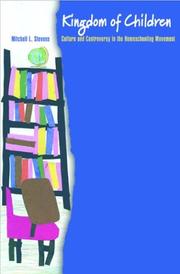| Listing 1 - 2 of 2 |
Sort by
|

ISBN: 0691114684 0691058180 9786612087516 1282087517 140082480X 9781400824809 Year: 2009 Publisher: Princeton, NJ
Abstract | Keywords | Export | Availability | Bookmark
 Loading...
Loading...Choose an application
- Reference Manager
- EndNote
- RefWorks (Direct export to RefWorks)
More than one million American children are schooled by their parents. As their ranks grow, home schoolers are making headlines by winning national spelling bees and excelling at elite universities. The few studies conducted suggest that homeschooled children are academically successful and remarkably well socialized. Yet we still know little about this alternative to one of society's most fundamental institutions. Beyond a vague notion of children reading around the kitchen table, we don't know what home schooling looks like from the inside. Sociologist Mitchell Stevens goes behind the scenes of the homeschool movement and into the homes and meetings of home schoolers. What he finds are two very different kinds of home education--one rooted in the liberal alternative school movement of the 1960's and 1970's and one stemming from the Christian day school movement of the same era. Stevens explains how this dual history shapes the meaning and practice of home schooling today. In the process, he introduces us to an unlikely mix of parents (including fundamentalist Protestants, pagans, naturalists, and educational radicals) and notes the core values on which they agree: the sanctity of childhood and the primacy of family in the face of a highly competitive, bureaucratized society. Kingdom of Children aptly places home schoolers within longer traditions of American social activism. It reveals that home schooling is not a random collection of individuals but an elaborate social movement with its own celebrities, networks, and characteristic lifeways. Stevens shows how home schoolers have built their philosophical and religious convictions into the practical structure of the cause, and documents the political consequences of their success at doing so. Ultimately, the history of home schooling serves as a parable about the organizational strategies of the progressive left and the religious right since the 1960's.Kingdom of Children shows what happens when progressive ideals meet conventional politics, demonstrates the extraordinary political capacity of conservative Protestantism, and explains the subtle ways in which cultural sensibility shapes social movement outcomes more generally.
Home schooling --- Educational sociology --- Sociology of education --- United States --- United States of America
Multi
ISBN: 9781139086387 9781107018051 9781107562301 1107018056 1107562309 1139989715 1139985094 1316005836 131600807X 1316003574 1139086383 1316012573 1316001334 9781316008072 9781316003572 9781306857802 1306857805 9781139989718 9781139985093 9781316012574 9781316001332 9781316005835 9781316001332 Year: 2014 Publisher: Cambridge New York
Abstract | Keywords | Export | Availability | Bookmark
 Loading...
Loading...Choose an application
- Reference Manager
- EndNote
- RefWorks (Direct export to RefWorks)
Social class is often seen as an intractable barrier to success, yet a number of children from disadvantaged backgrounds still manage to show resilience and succeed against the odds. This book presents the findings from fifty Child and Family Case Studies (CFCS) conducted with 13-16 year olds. The authors look specifically at the roles that people and experiences - at home, in schools and in the wider community - have played in the learning life-courses of these children; how these factors have affected their achievement; and explanations and meanings given by respondents to the unique characteristics, experiences and events in their lives. Featuring the voices of real parents and children, and backed up by a decade of quantitative data, this is a compelling record that will help readers to understand the complex nature of social disadvantage and the interplay between risk and protective factors in homes and schools that can make for a transformational educational experience.
Education --- Social classes --- Educational equalization --- Children with social disabilities --- Youth with social disabilities --- #SBIB:316.334.1O340 --- #SBIB:303H34 --- Autogestion (Parent participation in education) --- Parent involvement in children's education --- Parent participation in children's education --- Parental involvement in children's education --- Parental participation in children's education --- Home schooling --- At-risk youth (Social sciences) --- Socially handicapped youth --- Youth at risk (Social sciences) --- People with social disabilities --- Youth with disabilities --- Socially handicapped children --- Children with disabilities --- Educational equality --- Educational equity --- Educational inequality --- Equal education --- Equal educational opportunity --- Equality of education --- Equalization, Educational --- Equity, Educational --- Inequality, Educational --- Opportunity, Equal educational --- Affirmative action programs in education --- Class distinction --- Classes, Social --- Rank --- Caste --- Estates (Social orders) --- Social status --- Class consciousness --- Classism --- Social stratification --- Social aspects --- Parent participation --- Onderwijs en sociale verandering, onderwijs en samenleving --- Kwalitatieve methoden: grondige gevallenstudie, casework, social work --- Aims and objectives --- Sociology of education --- Social classes. --- Educational equalization. --- Social aspects. --- Parent participation.
| Listing 1 - 2 of 2 |
Sort by
|

 Search
Search Feedback
Feedback About UniCat
About UniCat  Help
Help News
News